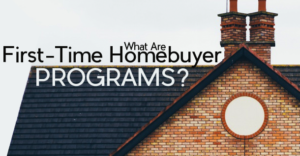Down payment assistance programs. Learn about low down payment options.
First-Time Home Buyer Benefits: How to Qualify
Down payment assistance programs and qualifying as a first-time home buyer doesn’t mean you’ve never owned a house. For example, you may qualify as a first-time home buyer if you haven’t owned your principal residence in the past three years.
Meeting first-time home buyer qualifications unlocks many benefits, including low- or no-down-payment loans, down payment assistance, grants and more.

Subsequently those perks can be worth a lot of money.
Down payment assistance programs: Do I qualify as a first-time home buyer?
You are typically considered eligible to apply for first-time home buyer loans and benefits if you haven’t owned your principal residence within the past three years.
First-time home buyer benefits
Benefits can include low- or no-down-payment loans, grants, lower private mortgage insurance cost, and down payment assistance.
Is there an income limit to qualify as a first-time home buyer?
Income limits come into play when you are applying for local, state or federal government assistance. The Washington State Housing Finance Commission (WSHFC) has a $145,000 income limit for their Home Advantage program. WSHFC’s House Key program’s income limits vary by county and family size.
Some low-down-payment conventional loans like Fannie Mae’s HomeReady or Freddie Mac’s HomePossible do, too.
Down payment assistance programs: How to qualify for a first-time home buyer grant
Grants are forgivable loans that typically don’t require repayment are available to low- and moderate-income borrowers through a new program called the HomeStar Grant. Funds can only be applied towards the closing costs, but can save you thousands of dollars. You will need to contact us to get more information and how easy it is to qualify.
How to qualify for down payment assistance.
Grants, down payment assistance and closing cost assistance are often offered by local and state housing authorities. Again, qualifications do vary. This is our area of expertise therefore we provide the education to help you understand the details on it will apply to you.
Don’t be surprised if a first-time home buyer class is required to qualify for a grant or down payment assistance. Our classes are designed to help you navigate the home buying process, and can be a good idea to take whether they’re mandatory or not. Start by registering for one of our classes!
How to find first-time home buyer loans
If you’re looking to snag a loan tied to assistance provided by a local or state housing agency, you’ll need to use an agency-authorized lender like Curt Tiedeman (License NMLS 35554) at Caliber Home Loans. He is one of the primary educators for this site and has been educating and helping first-time buyers for over 25 years.
Down payment assistance programs: What are the requirements to qualify for a first-time home buyer loan?
Qualifications required for approval of a loan vary by the type of mortgage — but here are some general guidelines:
- Conventional loans: For a 3% down payment, you’ll need at least a 620 credit score and a debt-to-income ratio below 45%. The higher your credit score or the lower your debt, the better your chances are for approval.
- FHA loans: If you want a down payment as low as 3.5%, you’ll need a credit score of 580 or higher. For example, WSHFC does require a minimum 620 credit score for down payment assistance. Two quick reasons lenders use FHA: 1) A debt ratio is allowed up to 50% of your gross monthly income. 2) The loan program is more credit ding friendly and is more lenient when it comes to medical collections.
- VA loans: VA loans are provided to our veterans. Firstly, they come with a 0% down payment requirement up to $484,350 and no monthly mortgage insurance cost. While VA-backed loans don’t have a minimum credit score as a part of their official requirements, many lenders look for a score of 580 to 620 or better.
- USDA loans: Another no-down-payment option, USDA-backed loans are typically issued for rural properties. Income and purchase price limits apply. The USDA program normally requires a 640 or better credit score, but exceptions with documentation can allow for a lower score. To see if a property you are interested in qualifies you can input the address at the USDA property eligibility website.
In conclusion, if you’re interested in down payment assistance programs you can start by completing your education in home ownership! One of our accredited classes will help you put the puzzle together!

